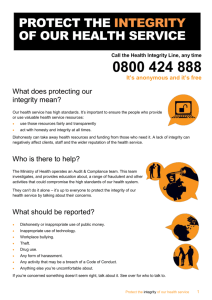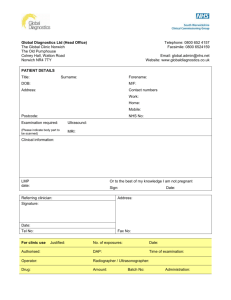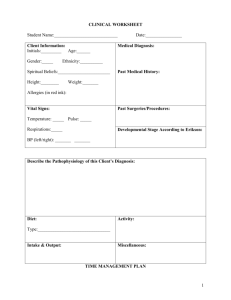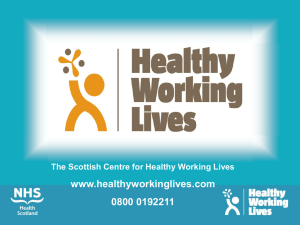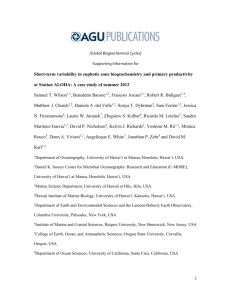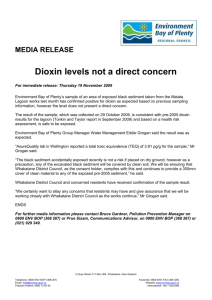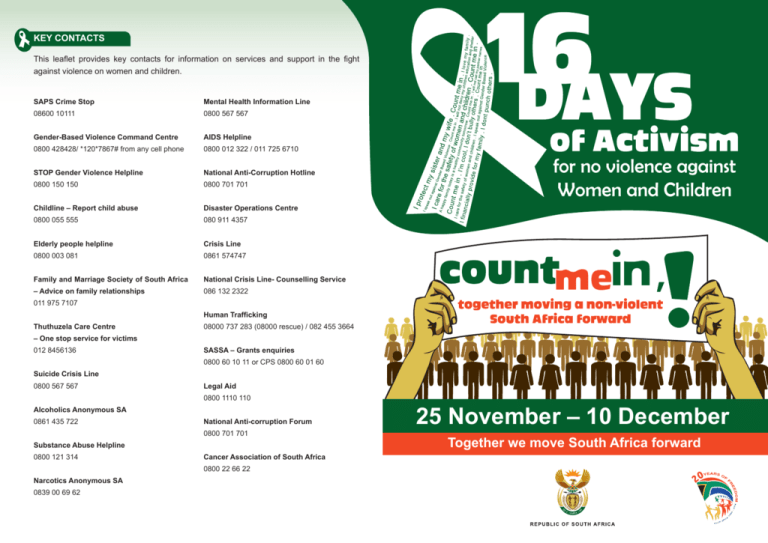
KEY CONTACTS
This leaflet provides key contacts for information on services and support in the fight
against violence on women and children.
SAPS Crime Stop
Mental Health Information Line
08600 10111
0800 567 567
Gender-Based Violence Command Centre
AIDS Helpline
0800 428428/ *120*7867# from any cell phone
0800 012 322 / 011 725 6710
STOP Gender Violence Helpline
National Anti-Corruption Hotline
0800 150 150
0800 701 701
Childline – Report child abuse
Disaster Operations Centre
0800 055 555
080 911 4357
Elderly people helpline
Crisis Line
0800 003 081
0861 574747
Family and Marriage Society of South Africa
National Crisis Line- Counselling Service
– Advice on family relationships
086 132 2322
011 975 7107
Human Trafficking
Thuthuzela Care Centre
08000 737 283 (08000 rescue) / 082 455 3664
– One stop service for victims
012 8456136
SASSA – Grants enquiries
0800 60 10 11 or CPS 0800 60 01 60
Suicide Crisis Line
0800 567 567
Legal Aid
0800 1110 110
Alcoholics Anonymous SA
0861 435 722
National Anti-corruption Forum
25 November – 10 December
0800 701 701
Together we move South Africa forward
Substance Abuse Helpline
0800 121 314
Cancer Association of South Africa
0800 22 66 22
Narcotics Anonymous SA
0839 00 69 62
How do I know I am being abused?
How do I help an abused child?
There are two main ways that you can tell if you are being abused:
• Talk to them gently
• Don’t interrogate. Let the child explain to you in his or her own words what happened, but don’t
interrogate the child.
• Assure them they are not in trouble and that you will keep them safe.
• Tell them that you believe them and DO so
• Contact your nearest social worker and report the case
• Call Child line where you can report the case anonymously
1. If someone is saying things to you that you feel are offensive to you and your integrity and are
hurting your feelings. The abuser may also ridicule or name-call, intimidate, harass, or stalk you.
That is VERBAL, PSYCHOLOGICAL and EMOTIONAL abuse.
2. If someone is touching you in a way that is undignified, harmful – e.g. hitting, forcing you to have
sex, pulling hair, grabbing or smacking you. The abuser may also damage your property or enter
your residence without your permission. That is all PHYSICAL abuse.
Nobody has the right to hit, push, shove, shake, kick, slap or punch you.
Who do I call if someone I know is being abused?
If they love you, they would not harm you. If they respect you, they will not treat you with indignity and
disrespect.
•
•
•
•
What do I do if I am being abused?
How can I stop abusing my partner/child?
• Don’t suffer in silence: If you are being physically, psychologically (mentally), emotionally or
sexually abused, it is important that you seek help. You do not have to continue to suffer in silence.
• Acknowledge that what you are doing is wrong (no matter the degree).
• Stop rationalizing abusive treatment of other people as acceptable.
• Abuse is NEVER healthy or acceptable regardless of the messages you may have been taught or
witnessed in the past.
• If alcohol makes you more likely to commit violence, stop or reduce.
• Avoid alcohol and drugs in dealing with your problems.
• Exercise and listen to soothing music to deal with stress.
• Walk away from the confrontation until you are calmed down
• Go to the family elders, trusted friend, neighbour, church elders and community leaders for
mediation of disputes.
• Seek professional assistance of a psychologist or other professionals.
• Talk to someone you can trust: confide in a friend, a neighbour, a relative, a spiritual leader or
elder, a doctor, or a counsellor.
• It is not your fault: There is no excuse for any form of abuse and you do not have to put up with it.
Both physical and emotional abuse is against the law and help is available through the legal system.
• You can get help: You can use the legal system to help you.
• Go to the Domestic Violence Court closest to you and apply for a Protection Order.
• Lay a criminal charge against the abuser, for example rape, sexual assault or physical violence
What are the signs that my friend is being abused?
•
•
•
•
unexplained bruises, broken bones, sprains, or marks
excessive guilt or shame for no apparent reason
secrecy or withdrawal from friends and family
avoidance of school or social events with excuses that don’t seem to make any sense
How do I help an abused friend?
• Listen: A person who is being abused needs someone to empathetically listen to and believe him
or her.
• It is not his/her fault: Help your friend understand that it is not his or her fault and that they are
not the bad person but the abuser/perpetrator.
• Encourage him/her to seek help: Your friend also needs your encouragement to get help
immediately from an adult, such as a parent, family member, or guidance counsellor.
• If a friend has been raped: Encourage the friend to go to a hospital within 72 hours to test for HIV.
The hospital may start them on a short course of antiretroviral treatment that can reduce chances
of getting HIV and report the matter to the police
Gender-based Violence Helpline: 0800 428 428 / *120*7867 from any cell phone
Childline: 0800 055 555
SAPS Crime Stop: 08600 10111
AIDS Helpline: 0800 012 322 / 011 725 6710
Who can I call to help me stop my abusive behaviour?
• Gender-based Violence Helpline: 0800 428 428 / *120*7867 from any cell phone
• Stop Gender-based Violence Helpline: 0800 003 081
• Suicide Helpline: 0800 567 567
REMEMBER
Despite the fact that there is no time limit on reporting rape or laying a charge, it is however
advisable that reporting rape or laying a charge be done as soon as possible. It is easier to get
evidence needed for the court case when the rape or any abuse is reported as soon as possible to
ensure that the perpetrator is arrested. However, if the sexual crime was a sexual assault rather than
rape, you have 20 years within which to lay a charge of sexual assault. Even though the delays in
reporting may no longer be used against you in court, forensic evidence (physical evidence such as
semen and hair left on your body after the rape) may be lost. When raped, do not wash before reporting to the police station or presenting yourself to the nearest clinic for forensic evidence to be collected
and preserved.
Violence against women and children is never acceptable,
never excusable, and never tolerable.

